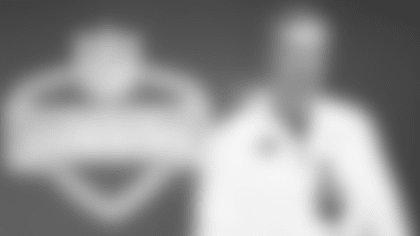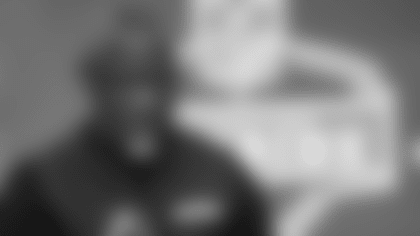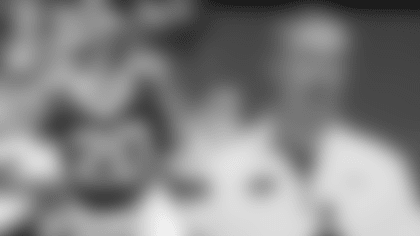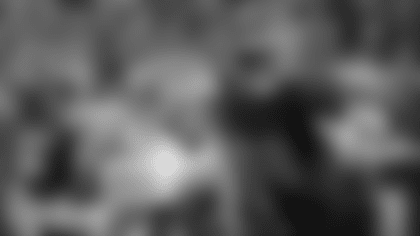Transcript of head coach Eric Mangini's news conference with the New York Jets media Thursday morning:
One piece of housekeeping: We've released Chris Davis from the practice squad and re-signed David Clowney. David replaces Chris.
Yesterday was a good practice. We got a lot of things accomplished in terms of our first- and second-down package, introduced a little bit of third down and covered two-minute. Some good situations came up in the two-minute period and that is what you're always looking for because those things are unscripted and people just have to react. Coaches have to react and the players have to react. Overall, I thought it was a good start to the week.
On whether he has an update on Jonathan Vilma …
No. We'll have one today. In terms of practice, I do have an update. He will not be practicing today.
On the results of Vilma's tests …
We're still looking through that and the doctors are looking through it. With any injury, we go through the process and evaluate throughout the week.
On if he's considering activating LB Matt Chatham …
It's really the same thing. We looked at him last week and we'll look at him through the course of the week. I think he's making more and more progress and that will be a decision we make much later in the process once we go through the full week.
On rookie LB David Harris …
He's making good progress. Similar to [Darrelle Revis], there are things he hasn't experienced and he has to get used to experiencing those things. One of the things we did in training camp, and one of the things we believe in, we put a lot of different people in. Jon's a guy that historically doesn't miss much time, so he's usually calling the signals. That's why it's so important to get different voices in there and work in different combinations of people, because you never know when you may have a guy missing time during the game or whatever the case may be.
On whether Harris would take on signal-calling duties …
He would take over the duty. Sometimes you can have Eric Barton do it, you can have [Brad] Kassell do it, you can mix different people in there. I've used both combinations of linebackers. Sometimes I use the Will, sometimes I use the Mike, but right now he is doing that.
On if it will be tough for Harris to take on the added responsibility of play-calling …
He did it all during college. He's pretty used to having that role. I'm sure it's probably an adjustment for him the other way, where for the first time he wasn't calling the signals. That's something that should be a fairly smooth transition. He's done it several times through the course of training camp, preseason and the regular season.
On whether he expects Vilma to practice Friday ...
It's something that we're just going to have to see. I know today he won't be able to, but we'll just really have to see.
On whether surgery is a possibility …
It's really just going to matter what the results are.
On whether Vilma might be out for the rest of the season …
It's really the same thing. I'm going to look at the information. We have to get more information and that's why we do all the tests and go through the process, the protocol and see where it is.
On if that means there's a possibility Vilma could be out for the season …
No, it just means that we're looking at the tests and talking to doctors and following the normal procedure that we do with everybody.
On if Harris' ability has manifested itself in the playing time he's gotten …
The traits he had in college, and [Jets linebackers coach] Jim Herrmann had him in college, so Jim knew him extremely well, he knew what type of person he was, what type of player he was in terms of his presence in the huddle, the things he could do in both the running and passing games, and had pretty intimate knowledge of who this person was. All of those traits that we liked about him, you see at different times show up throughout the course of the season.
Of course, in the preseason he had some good impact hits where he'll come downhill and that's what you're looking for, where the running back is heading back as opposed to the tackler. Some nice fits on the guards and fullback when he's got to go and take on those guys, and fluid movement for a bigger guy in terms of pass coverage.
On Harris being analytical on the field …
He studies, and what I like with him, very similar to Darrelle, he takes the coaching, he improves with that and he spends a lot of time with the older guys who have the experience, who have seen so many different things and combinations of routes, protections, all of the variables he may not have been exposed to in college, and they can help him from an experience perspective.
On if he's more advanced vs. the run or the pass ...
I'd say there are positive things in both areas. Anytime you're learning a new system and new coverages, new run fits, there's going to be a learning curve in both sections. I do like the things he does in pass coverage for a bigger guy. Most of those bigger guys are usually a little slower, a little bit more like an aircraft carrier as opposed to a speedboat.
On whether this team is suffering more mental errors (MEs) this year than last …
I haven't looked at it in terms of pure MEs that have been assigned, and last year you had the 16 games of ME's, so that's a complete body of work. We have less exposure at this point. It's really game to game. There are some games last year where the MEs might have spiked and sometimes you spike MEs and you're still able to win the game. I don't think it's a function of just that element.
On whether he risked further injury having Vilma play in the second half …
There are times in every single game where different guys are injured and you do have a protocol in place for those things. You go through the protocol, you talk to the player. It's a comprehensive process. It's not just, "How you doing?" "Fine." And you move forward. So you have a process in place. It really happens in every game and it happens on every sideline in every game. You try to make the best decision you can make at that time.
On whether Vilma went through any tests Monday …
We go through the process of injured players right away.
On Vilma stating Tuesday he was not injured …
Jon's a really tough guy. Guys, when they're dealing with any type of setback, they deal with it differently. Jon is an extremely tough guy.
On if the injury could have been a result of a preexisting condition …
The injury was really based on the game.
On if he knows on which play Vilma was injured …
No.
On if he knows which knee is injured …
Yes.
On whether it's the right or the left knee ...
Tricky. It's one of those two [smiles].
On why he won't say which knee is injured …
Historically, whenever you have an awareness of an injury and opponents have an awareness of an injury, that is something that you can take into account when you're running routes, when you're running plays, the directions that you run plays, how a guy can cut or not cut, whether they're going to be quicker. What may be affected, that does come into the decision-making. What kind of routes you're going to run against them. What the likelihood of being able to take advantage of a slowed-down player might be.
On whether he's seeing much improvement in Revis …
He's really learning a lot each day, and as a rookie, when you talk to those guys that were rookies last year, the whole experience is unique. It's not something that any of those guys ever want to go back to. It's information overload between the playbook, the coaching staff, the change in technique, and then each game they're getting a significant amount of new information. The season goes on much longer, so those guys go through it and they don't know what to expect week in and week out because they've never gone through it and that's a transition. We've all been through that where it's new and you look back on it and you realize how much you learned and how much better you got each week because of the experiences you've had.
On Abram Elam and his ability to play physical …
I really like that about him. He's a physical player and he's physical on special teams. That translates into when he plays defense. He is a very high-energy guy, a high-motor guy. He's a good communicator, which I like. The penalty, it was a poor decision to try to get the ball on the ground, but it wasn't a function of trying to do anything that was emotionally based. It wasn't that he was angry and trying to do something negative. He just made a poor decision by trying to rip it out when it wouldn't have mattered anyway, if he had gotten the ball out.
You can live with those things because of the intent. He was trying to make something positive happen, got a little bit out of control when he blitzed there on third-and-2 and had a chance in the hole. I think he's another guy that is going to internalize that, learn from it and, next time he gets the opportunity, be more controlled. I do like all those qualities about him and his physical presence is one of the best qualities.
On whether unnecessary roughness penalties linger in his game evaluation …
The penalties, unsportsmanlike conduct penalties, that are emotionally based, I have no tolerance for, because I think those are penalties where it makes you feel good for five seconds, it makes you feel good for that moment, but it's a 15-yard penalty. It usually ends up significantly hurting the team. It gives them the first down, it changes field position, and I have no tolerance for those whatsoever. It's so selfish. It's so selfish and it is something that is completely under your control. They always get the guy that hits second, and they have pads on so you're not really accomplishing much. It's selfish and really not that smart.
On whether it was difficult to assess Elam's intent on the penalty …
I wasn't sure at that moment what it was. At that point where we were on the field, it's a good example. You get a penalty like that and it changes the field position. I wasn't sure what that was. Where I was looking, it was pretty easy to misinterpret. I was behind the play, and from that angle I can see what the officials saw. It looked totally different from that angle than what it looks like on tape.
On whether he came to his conclusion by looking at the tape …
It's really clear on tape what he was trying to do. When you're looking at it from where the official was and where I was, it was much less clear as to what the intent was. It looked like he was punching the guy almost.
On Hank Poteat's first interception vs. Philadelphia …
And he got another one. He's hot.
On what he's seen in Poteat …
Hank to me is the classic example of he knows what to do, he does exactly what he's being coached to do, and he's the same player every day. You can expect a very consistent level of performance out of Hank. You know that every single play he's going to try as hard as he can and do everything he can to be in the right spot. He studies hard, he works at anticipating routes and he's a good tackler, all of those things combined. I've known him for a long time, and that's what you like about Hank.
On if he scouted Poteat in college …
We had him in New England. I had him there and worked with him there and got to know him there.














